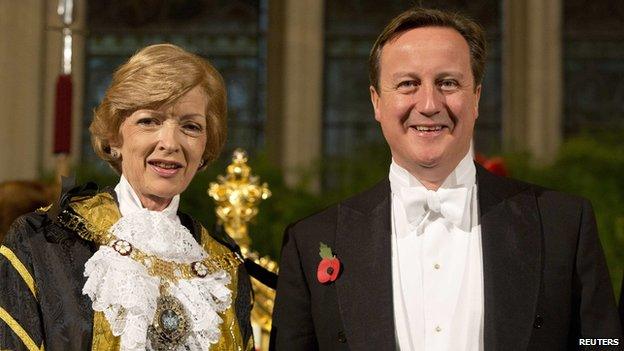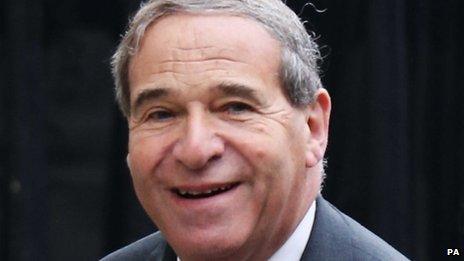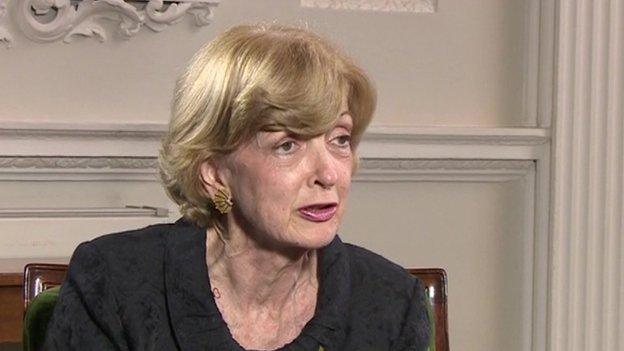Abuse inquiry: Government urged to act quickly after Woolf resignation
- Published
Ed Miliband: Government should "consult with victims" before new appointment
The government has been urged to get an inquiry into historical child sex abuse moving quickly after Fiona Woolf became the second chairwoman to stand down.
Labour leader Ed Miliband said ministers had "botched" two attempts to get the investigation going.
The inquiry members could start the process of taking evidence before a new head was appointed, he said.
Meanwhile, former attorney general Dominic Grieve suggested looking abroad to find a suitable new candidate.
Mrs Woolf resigned on Friday amid concern about her links to establishment figures.
Home Secretary Theresa May, who has faced criticism of the government's handling of the inquiry, has said she will consult victims' groups before appointing a successor and will make a statement in the House of Commons on Monday.
The independent inquiry was set up to look at how public bodies dealt with historical allegations of child sex abuse.
However, Mrs Woolf became the second person to step down as its head, after questions were raised about her social ties to former Home Secretary Lord Brittan.
One claim expected to be brought up in the inquiry is that a dossier containing allegations of paedophile activity involving Westminster MPs was handed to Lord Brittan in the 1980s.
Mrs Woolf's position came under further pressure when it emerged she had re-written a letter detailing her contact with Lord Brittan, who denies any failure to act.
'Waited too long'
Mr Miliband said the government must now consult with the victims and then "get on with it".
"I think the right thing to do is to consult with the victims before names are put forward and then, once you have consulted with the victims, it is right to appoint the head of the inquiry," he said.
Speaking on BBC Radio 4's Today programme, shadow home secretary Yvette Cooper said there was a "strong case for the inquiry getting going even without a chair".
She said there were already "many distinguished people" on the inquiry panel.

Prime Minister David Cameron had given his support to Mrs Woolf, who is Lord Mayor of London
The "real issue" now was making sure victims of abuse were consulted and involved in the process, she said, adding that it was "really shameful" that Mrs May had so far failed to do this.
On the same programme, Mr Grieve reinforced the need to "get on with this inquiry", but said a new chairperson would have to "command the confidence of victims".
"Undoubtedly we need to find an independent figure. It may be that the best way of doing that is to go abroad to one of the Commonwealth countries, with a similar justice system to our own," he said.
"There are lots of people around who have expertise, who may well not have moved in quite the same political-public circles."
Peter Wanless, the chief executive of the children's charity NSPCC, said: "We need progress sooner rather than later. Those who would like to kick awkward questions into the long grass must not be allowed to derail justice - which too many people have waited too long to secure."
'Delay'
However, Peter McKelvie, a former child protection manager, whose allegations about child abuse led to a 2012 police investigation, said the entire inquiry needed to begin again - including panel selection.
He said: "There should be a return to absolute base, and start the whole process again from the beginning - and it should be a survivor-led process."
He added: "Not one survivor of child sexual abuse is responsible for this delay."
He said the process so far had been "farcical".
Mrs Woolf's resignation comes after the first person appointed to lead the inquiry - Baroness Butler-Sloss - stepped down in July when concerns were raised about the fact that her late brother was attorney general during the 1980s.
It follows claims made over many years about paedophiles in powerful places and alleged establishment attempts to cover up their actions.
Lord Brittan could be called to give evidence to the inquiry, which will look at whether public bodies and other institutions did enough to protect children from sexual abuse from 1970 to the present day.
He denies any wrongdoing in the way a "dossier" on alleged high-profile paedophiles was handled in the 1980s.
Earlier this month Mrs Woolf, who is Lord Mayor of London, disclosed that she lived in the same street as Lord Brittan and had had dinner with him five times between 2008 and 2012 - but said he was not a "close associate".
It has also emerged that a letter from Mrs Woolf about her links with Lord Brittan was re-written seven times.

Abuse inquiry: How we got here

Mrs Woolf had been under pressure to resign owing to her links with Lord Brittan
1 July - MP Simon Danczuk calls on former Home Secretary Leon Brittan to say what he knew about paedophile allegations passed to him in the 1980s
7 July - Government announces independent inquiry into the way public bodies investigated and handled child sex abuse claims. Baroness Butler-Sloss chosen as head
9 July - Baroness Butler-Sloss faces calls to quit because her late brother, Sir Michael Havers, was attorney general in the 1980s
14 July - She stands down, saying she is "not the right person" for the job
5 September - Lord Mayor of London Fiona Woolf named the new head of the inquiry
11 October - Mrs Woolf discloses, external she had five dinners with Lord Brittan from 2008-12
22 October - Abuse victim launches legal challenge against Mrs Woolf leading the inquiry, amid growing calls for her resignation
31 October - Victims' groups meet Home Office officials, saying Mrs Woolf's position as head of the inquiry is 'unsuitable'

- Published31 October 2014
